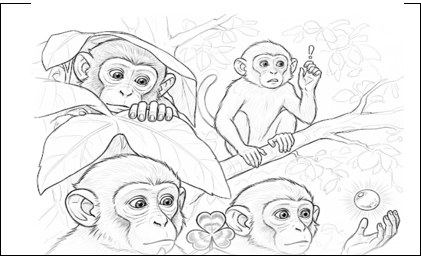Imagine, amidst the bustling streets and vibrant life of any modern city, the echoes of our ancient past. We, the inheritors of this world, are the product of a remarkable journey, one intricately woven with threads of curiosity, a bit of luck, and an extraordinary capacity to adapt. However, let us remember there are several or countless instances extraordinary adaption in the animal kingdom.
But to truly understand our present, we must delve into our ancestral roots, back to a time when our forebears were, in essence, “curious lucky monkeys.”
🔍 Curiosity: The Engine of Innovation
Our very nature—the innate human drive to explore and understand—is no accident. It is a deeply ingrained evolutionary trait, a force that propelled our ancestors to venture beyond the familiar, to seek new horizons and unravel the mysteries of their world. This inherent curiosity was the engine of innovation, leading to the discovery of fire, the crafting of tools, and the eventual mastery over our environment. It is the same spirit that today fuels the technological advancements we witness, a testament to our relentless pursuit of knowledge.
🍌 Fruit, Glucose, and the Brain’s Reward
But curiosity alone is not enough. Our journey was also paved with a degree of fortune. The environment our ancestors inhabited provided opportunities, and perhaps most crucially, a specific type of sustenance: fruit. These vibrant, sweet treasures were more than just a meal; they were a concentrated source of energy, packed with glucose. This readily available fuel played a vital role in the development of our most defining feature—our large, complex brain.
Furthermore, this diet may have had a more direct impact on our behavior. The consumption of high-energy foods triggers the brain’s reward system, releasing dopamine and creating a sense of pleasure. This positive reinforcement would have encouraged our ancestors to actively seek out these resources, even if it meant venturing into unknown or potentially risky territories. The allure of a sweet reward could have been a powerful motivator, pushing them to explore further and take greater chances—behaviors that are intrinsically linked to both curiosity and the discovery of new opportunities.
⚠️ Risk and Adaptation: The Survival Equation
This willingness to take risks, driven by the pursuit of rewarding resources, was crucial in shaping our capacity for adaptation. The world is a constantly changing landscape, and survival depends on the ability to adjust to new conditions. Our ancestors’ curious nature led them to encounter new environments, and their inherent adaptability, honed by the challenges and rewards of exploration, allowed them to thrive in these diverse settings.
This adaptability isn’t just physical; it encompasses our remarkable ability to learn, reason, and cooperate—traits that have allowed us to not only survive but to flourish and build complex societies, like the one we see today.
🧠 Memory and Storytelling: The Cultural Leap
One of the most profound adaptations of our species is not just our ability to explore or survive, but to remember and share. Our ancestors didn’t just eat fruit and move on—they told stories about where to find it, how to get there, and what dangers lay ahead. This capacity for intergenerational learning allowed knowledge to accumulate, giving rise to culture, myth, and eventually civilization.
Even today, our stories—whether scientific theories or religious parables—are how we make sense of the world. They are the vessels through which curiosity becomes wisdom.
🧬 The Hidden Cost of Intelligence
While our large brains gave us language, art, and technology, they also brought existential anxiety. Unlike other animals, we are aware of our mortality, capable of imagining futures that may never come to pass. This awareness is both a gift and a burden—fueling our search for meaning, but also our fear of meaninglessness.
This duality may explain why both religious and evolutionary perspectives persist: one soothes the fear, the other embraces it.
📱 Modern Echoes of Ancient Drives
In the digital age, our ancient instincts still shape our behavior. The dopamine rush from discovering fruit is mirrored in the thrill of a social media notification or a viral video. Our brains, wired for reward and novelty, now navigate a landscape of algorithms and screens—but the underlying drives remain the same.
Understanding this can help us design healthier, more intentional lives—ones that honor our evolutionary heritage while transcending its limitations.
🌌 From Evolution to Existence
With this understanding of our origins, the question of our place in the universe takes on a new light. When we view ourselves as a product of a long, unguided process of luck and adaptation, the idea that we are the singular, most important creation of the cosmos begins to feel less plausible. From a cosmic perspective, our existence is a fleeting moment on a small planet orbiting a single star among billions. This realization is not meant to diminish us, but to place our significance within a more humble, grounded context.
🔮 The Search for Meaning: Two Paths
This brings us to life’s most profound question: who are we, and what is it all for? For centuries, people have turned to religion for answers.
✝️ The Religious Perspective
This viewpoint often posits a Creator—a divine intelligence that, much like a human architect designing a city, created the universe with a specific purpose. In this narrative, our meaning is tied to our relationship with this Creator, and our well-being is promised through faith and miracles. It provides a sense of security and a pre-written script for our lives.
And, surrender. Surrender to this pre-written script.
Most people adopt this as it is the easier alternative. Surrender to God, this is theme of all religious texts.
Surrendering is important. This is belief. But to what?
🧬 The Evolutionary Perspective
An alternative arises from our evolutionary story: a call to surrender not to a deity, but to the reality of our evolutionary constraints.
This is not a surrender of hope or purpose, but an acceptance that we are the product of a process. In this view, meaning isn’t handed down to us; it’s something we are uniquely equipped to discover and create for ourselves. The purpose of life becomes a personal project—to find joy in our relationships, wonder in our explorations, and value in our contributions, all while knowing we are a remarkable, albeit small, part of a much larger cosmic story.
⚖️ The Appeal of Each Perspective
The Appeal of Each Perspective
This divergence in worldviews raises a critical question: why do most people subscribe to the religious perspective, and what are the unique benefits of the evolutionary one?
The Appeal of the Religious Perspective
The religious viewpoint holds immense appeal for a variety of reasons, some of which which are listed below. It’s often more comforting and easier to grasp than a complex, unguided process.
- Comfort and Security: It offers a sense of security, providing a divine plan and the promise that someone is in control, which can be especially comforting during times of uncertainty and suffering.
- Ready-Made Answers: Religion often provides a clear set of answers to life’s big questions, sparing individuals the deep thinking required to find their own meaning.
- Community and Social Cohesion: It builds strong communities and social bonds. Rituals and shared beliefs create a sense of belonging and support that is essential to human well-being.
- Commercial Interests: It is also true that religion becomes intertwined with commercial interests, with organizations and leaders using their influence to control funds and gain power.
The Benefits of the Evolutionary Perspective
While the evolutionary perspective can initially feel insecure and lonely, it offers its own distinct benefits.
- Intellectual Freedom: It doesn’t require allegiance to any specific sect or group, or pre written text which can free an individual from the complexities, politics, and potential corruption that can arise within large organizations.
- Authentic Meaning: It places the responsibility of creating meaning directly on the individual. The purpose you find is not pre-ordained but is a reflection of your own values and actions.
- Awe and Wonder: It fosters a deep sense of awe and wonder about the universe, not as a product of a blueprint, but as a result of a beautiful, chaotic, and unimaginably long process of cause and effect. It’s a perspective that finds wonder in the fact that we, the curious lucky monkeys, exist at all.
Surrender to this perspective. Be the Curious Lucky Monkey!!







